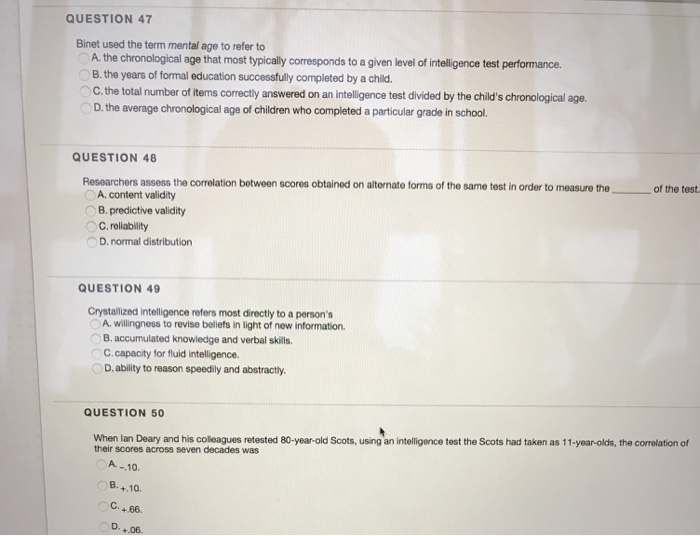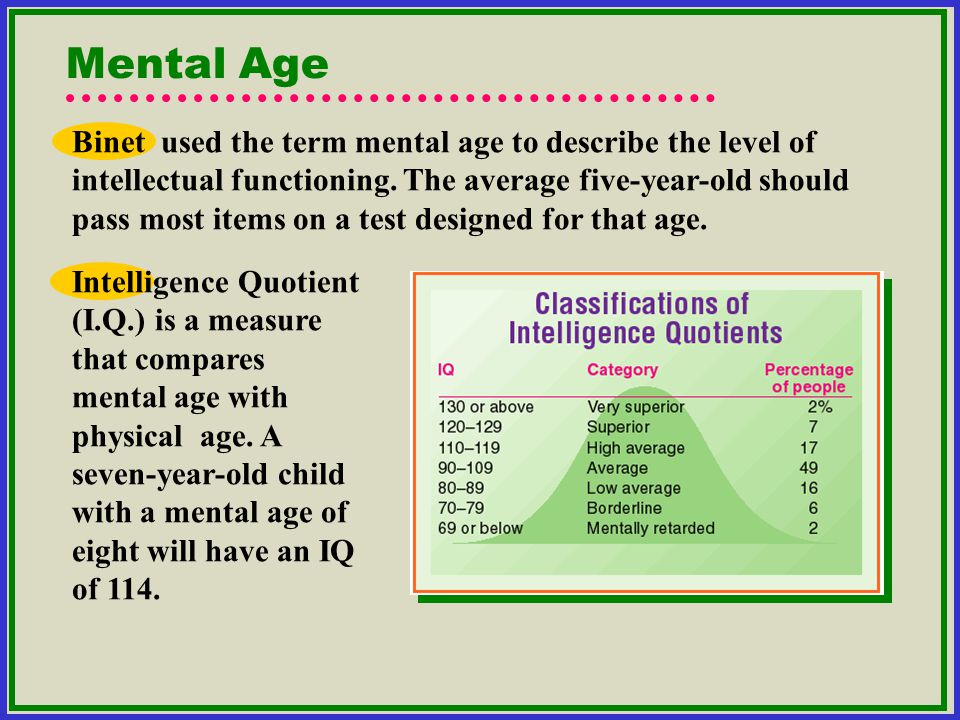Binet Used the Term Mental Age to Refer to
The modern theories of intelligence began to emerge along with experimental psychology. The chronological age that most typically corresponds to a given level of intelligence-test performance.

Chapter 9 Intelligence And Individual Differences In Cognition
Wilburs mental age is 4.

. Binet and colleague Theodore Simon developed a series of tests designed to assess mental abilities. The WAIS was initially created by David Wechsler. Binet used the term mental age to refer to A the average chronological age of children who completed a particular grade in school.
Binet used the term mental age to refer to - Financie Elveili Gouder Worden binet used the term mental age to refer to binet was a 19th century French philosopher psychologist and author. Mental age was first defined by the French psychologist Alfred Binet who introduced the intelligence test in 1905. He was one of the most prominent thinkers of his era and was well-known for his theories about the human mind and its limitations.
Anthropologists well known for their attempts to correlate cranial size and capacity with intellectual potential were Samuel Morton and Paul Broca. Binet used the term mental age to refer to the chronological age that most typically corresponds to a given level of intelligence test performance For the original version of the Stanford-Binet IQ was defined as mental age divided by chronological age and multiplied by 100. According to Binet mental age is the mental capacity or ability of an individual.
C the total number of items correctly answered on an intelligence test divided by the childs chronological age. Binets Intelligence Test. B the years of formal education successfully completed by.
Binet used the term mental age to refer to A the average chronological age of children who completed a particular grade in school. This is when much of psychology was moving from philosophical to more biology and medical science. B the years of formal education successfully completed by a child.
Binet used the term mental age to refer to A the average chronological age of from PSYCH 101 at Washington State University. Standardized tests designed to predict how well you will do in college are MOST appropriately called. Since the average mental age of adults does not increase past age 18 an adult taking an IQ test is assigned the chronological age of 18.
Binet used the term mental age to refer to A the average chronological age of children who completed a particular grade in school. During much of the 19th century theories of intelligence focused on measuring the size of human skulls. The scale they developed became known as the Binet-Simon Intelligence.
However if a 10-year-old has a mental age of 13 his IQ is 130 well above average. Binet used the term mental age to refer to The chronological age that most typically corresponds to a given level of intelligence test performance Five-year-old Wilbur performs on an intelligence test at a level characteristic of an average 4-year-old. Binet used the term mental age to refer to.
Rather than focus on learned information such as math and reading Binet instead concentrated on other mental abilities such as attention and memory. For instance an individual with a chronological age of ten years in correspondence to a given level of. B the years of formal education successfully completed by.
Binet used the term mental age to refer to A the average chronological age of from PSYCHOLOGY 1101 at University of Ottawa.

Chapter Scientists Are Not Sure Exactly What Intelligence

Solved Question 47 Binet Used The Term Mental Age To Refer Chegg Com

Solved Question 47 Binet Used The Term Mental Age To Refer Chegg Com

No comments for "Binet Used the Term Mental Age to Refer to"
Post a Comment